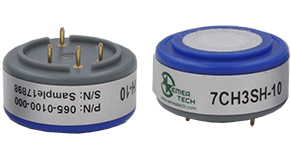 Datasheet download
Datasheet download
This sensor is designed for the measurement of Methanethiol concentration in gas phase. It can be used as the pin-to-pin replacement of the standard 7-series electrochemical Methanethiol sensors made by the other manufacturers.
| Nominal Range | 0 ~ 10 ppm |
| Maximum Overload | 20 ppm |
| Sensitivity (20℃) | 0.75 ± 0.20 μA/ppm |
| Response Time (T90) | ≤ 60 s |
| Zero Signal (20℃) | < ±0.2 μA |
| Baseline Shift (-20℃ ~ 50℃) | < 0.6 ppm |
| Resolution | 0.1 ppm |
| Linearity | Linear up to 10 ppm |
| Bias Voltage | 0 mV |

| Temperature Range | -20℃ ~ 50℃ |
| Pressure Range | 1 ± 0.1 atm |
| Humidity Range | 15% ~ 90%RH non-condensing |
| Long Time Output Drift | < 2% signal/month |
| Recommended Storage Temp | 10℃ ~ 30℃ |
| Expected Operating Life | 2 years in clean air |
| Storage Life | 6 months in original packaging |
| Warranty | 12 months |
| Max. Current at 20ppm CH3SH | < 0.2 mA |
| Max. O/C Voltage | 1.3 V |
| Max. S/C Current | < 1.0 A |
| Housing Material | ABS |
| Weight (Nominal) | 8 g |
| RoHS Compliance |
Output signals from the sensor pins are different. Inappropriate use of the pins in product design will affect the sensor functionality. Exposure to high concentrations of solvent vapors should be avoided under any condition. Mechanical overstress may cause deformation or cracks of the plastic enclosure of the sensor. If the sensor is used in extreme environmental conditions, please contact us for more details.
| Gas | Concentration (ppm) | Output Signal (ppm CH3SH equivalent) |
|---|---|---|
| Carbon Monoxide | 50 | < 5.5 |
| Sulfur Dioxide | 5 | < 2.1 |
| Nitrogen Dioxide | 5 | < -3.5 |
| Nitric Oxide | 25 | 0.0 |
| Ammonia | 50 | 0.0 |
| Hydrogen | 1,000 | < 10.0 |
| Hydrogen Sulfide | 25 | 40.0 |
Note: The cross sensitivities include but not limited to the above gases. It may also respond to other gases. The data in the table above may vary from different batches of sensors and the changes of test environment. Calibration using the gases that have the cross sensitivities to this sensor is not recommended.

This sensor is designed to be used in certain instruments for life critical applications. To ensure the sensor functions per its specifications inside the instrument, it is required to read the instrument user's guide carefully and comply with the calibration procedures by using certified target calibration gas before each use. Failure to do so may cause serious injury and fatality. Please do not open the sensor plastic enclosure because the electrolyte and other chemicals stored inside are harmful.
It is highly recommended for customers to validate the sensor performance using this document as a reference for their product designs or applications.